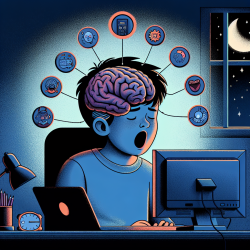Introduction
As a speech-language pathologist deeply committed to data-driven decisions, I understand the importance of incorporating research findings into practice. One fascinating study, "Sleep or Play Online Poker?: Gambling Behaviors and Tilt Symptoms While Sleep Deprived," offers insights that can be applied to improve child outcomes in educational settings. This study highlights the significant impact of sleep deprivation on decision-making, emotional regulation, and risk-taking behaviors, which are critical areas in child development and learning.
The Study: Key Findings
The research focused on online poker players, examining how sleep deprivation influenced their emotional and behavioral tilt during gambling sessions. The study revealed that sleep-deprived sessions led to higher emotional and behavioral tilt, increased risk-taking, and poorer financial outcomes. These findings are crucial as they demonstrate the broader implications of sleep deprivation on cognitive and emotional functioning.
Implications for Child Development
While the study centers on adult gamblers, the underlying principles of sleep deprivation affecting decision-making and emotional regulation are highly relevant to children. In educational settings, children who are sleep-deprived may exhibit similar challenges, such as difficulty concentrating, heightened emotional responses, and impaired decision-making abilities.
- Emotional Regulation: Just as sleep-deprived poker players struggle with emotional control, children may experience increased irritability and frustration when lacking adequate sleep.
- Decision-Making: Impaired decision-making in poker players parallels the challenges children face in making sound choices when sleep-deprived.
- Risk-Taking: Increased risk-taking behaviors observed in sleep-deprived gamblers can manifest in children as impulsivity and poor judgment.
Strategies for Practitioners
To mitigate the effects of sleep deprivation on children, practitioners can implement several strategies:
- Promote Healthy Sleep Habits: Educate parents and children about the importance of a consistent sleep schedule and creating a conducive sleep environment.
- Monitor Sleep Patterns: Use tools like sleep diaries to track children's sleep patterns and identify potential issues.
- Incorporate Restorative Practices: Integrate mindfulness and relaxation techniques into daily routines to help children manage stress and improve sleep quality.
Encouraging Further Research
While the study provides valuable insights, further research is needed to explore the specific impacts of sleep deprivation on children. Practitioners are encouraged to engage in research initiatives that investigate the relationship between sleep, cognitive functioning, and emotional regulation in children.
To read the original research paper, please follow this link: Sleep or Play Online Poker?: Gambling Behaviors and Tilt Symptoms While Sleep Deprived.










